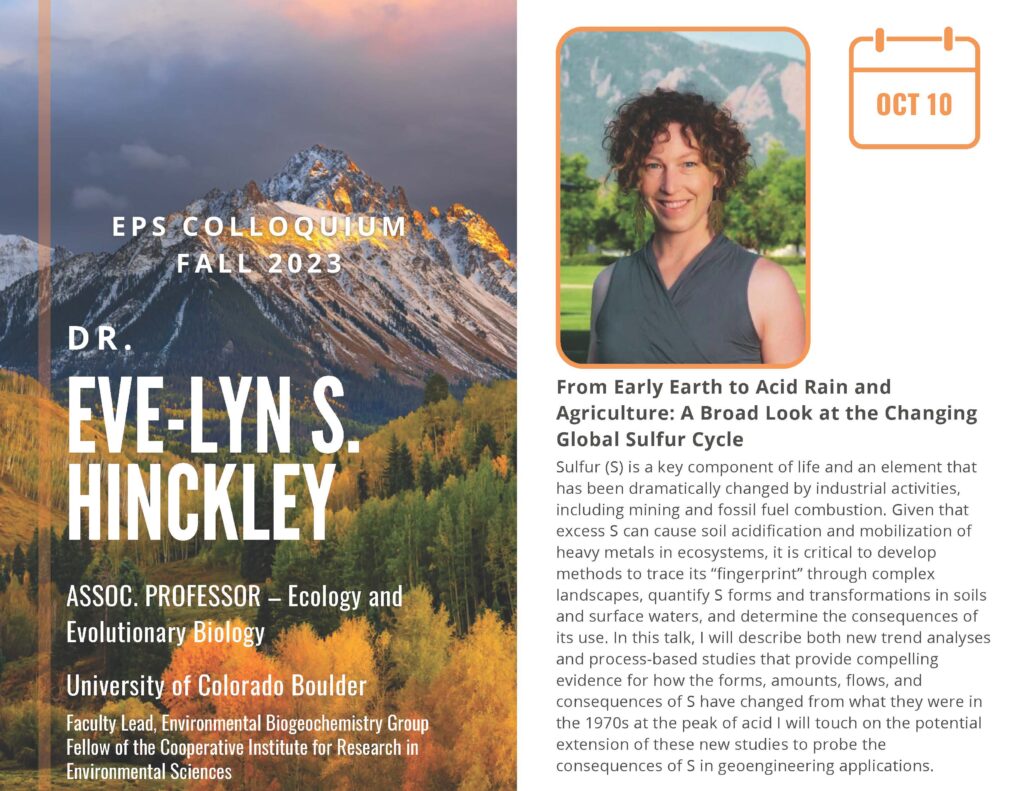EPS Colloquium – Eve-Lyn Hinckley, University of Colorado Boulder
From Early Earth to Acid Rain and Agriculture: A Broad Look at the Changing Global Sulfur Cycle
Sulfur (S) is a key component of life and an element that has been dramatically changed by human industrial activities, including mining and fossil fuel combustion. Today, the nature of how humans alter the global S cycle is changing. As atmospheric S deposition has declined in response to air quality regulations in the United States and Europe, there has been an increase in S fertilizer applications reported in many large-scale regional crop systems. In addition, intensification of agriculture has driven increased S inputs for other uses: as a pesticide, regulator of soil pH, and soil conditioner. Given that excess S can cause soil acidification and mobilization of heavy metals in ecosystems, it is critical to develop methods to trace the “fingerprint” of agricultural S through complex landscapes, quantify S forms and transformations in soils and surface waters, and determine the consequences of its use. In this talk, I will describe both new trend analyses and process-based studies that provide compelling evidence for how the forms, amounts, flows, and consequences of S have changed from what they were in the 1960s and 1970s when the dominant human manipulation of the S cycle was through mining and fossil fuel emissions. I will highlight studies from my research group that show exciting new methodological developments using radio- and stable isotopes of S adapted from the marine literature to trace S applications through large agricultural regions. I will also discuss the collaborative actions that researchers, land managers, and regulators may take to address the consequences of excess S in the environment. Finally, I will touch on the potential extension of these new studies to probe the potential consequences of S in geoengineering applications. Ultimately, I will make the case for how an element that has been far less investigated than carbon, nitrogen, and phosphorus should be a priority for study in the coming years.
To be added to the EPS colloquium mailing list, please contact Caroline Carr at carolinecarr@fas.harvard.edu.

Eve-Lyn Hinckley is an Associate Professor of Ecology and Evolutionary Biology and Fellow of the Cooperative Institute for Research in Environmental Sciences at the University of Colorado, Boulder. Her research focuses on studying the elements that underlie all life on Earth, with an emphasis on how they are changed by human activities and how those changes feed back to affect human welfare. Dr. Hinckley earned her Ph.D. in Geological and Environmental Sciences from Stanford University, and B.A. in Environmental Studies from Middlebury College. Her research on modern changes to the global sulfur cycle is supported by multiple funding agencies, including the prestigious CAREER program through The U.S. National Science Foundation, a grant from U.S. Department of Agriculture, and the National Geographic Society. Dr. Hinckley has been recognized as a University of Colorado Research & Innovation Office Faculty Fellow and Arts & Sciences Support of Education Through Technology Teaching Fellow.

